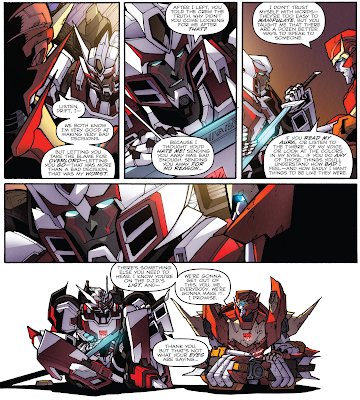In the uncompleted
Doctor Who story
Shada by Douglas Adams, the Doctor is visiting Cambridge when he hears the whispers of an alien device; he tells his friend Professor Chronotis, "I heard the strange babble of inhuman voices, didn't you?" Chronotis replies, "Oh, probably undergraduates talking to each other, I expect. I'm trying to have it banned." In the same spirit, I propose a ban on graduate students giving conference papers.
Not really (my wife helpfully reminded me that I was still a graduate student just over two years ago), but I recently just got home from doing a whole week of conferences, going straight from the
Children's Literature Association (ChLA) in San Antonio to the
Science Fiction Research Association (SFRA) in Milwaukee, and I am Full of Thoughts about Conferences.
Back in March,
I went to NCSA 2018, so I've done three conferences in five months, which is definitely the highest density of my academic career thus far. (In grad school, I averaged one per year. Man, non-trivial amounts of funding really help!) It's interesting to compare the culture of conferences; both ChLA and SFRA pride themselves on their friendliness, for example-- multiple people at both conferences mentioned how friendly they were-- but they go about it in different ways. ChLA has a lot of formal structures of friendliness: first-time attendees get a ribbon on their name badge, they can sign up for lunch with an older academic, there are themed lunch groups.
SFRA is more informal in this regard. Its friendliness rises out of the gregariousness of sf fan culture, which is of course made up of a lot of awkward nerds, but there's that sense that you've found your "place" when you arrive at an sf convention, and that applies to SFRA, too. Moreso than any other conference I go to, I feel like I can be reasonably assured that I can talk about a random text (broadly construed) and some random person will know what I'm talking about, which is because a lot of sf scholars are also sf fans, and thus read and watch widely within the genre. Like, I don't work on contemporary sf academically, but I have read enough and am plugged in enough that I can follow a presentation about William Gibson or
Twin Peaks or what have you even though I've read/watched neither. Conversely, there didn't seem to be many nineteenth-century scholars there, but everyone knows
The War of the Worlds well enough to follow my argument about it. You can grab a random person and have a conversation about
Star Trek: Discovery with ease... even if the other person hasn't seen it.
That said, this was my first time in a long time attending an academic conference without a "conference buddy"; at NCSA 2018 and 2017, I was with grad school friends. I knew many people at ChLA, including my roommate, but there was no one I was close friends with; at SFRA, I didn't really know anyone (my last time there was 2015). As an introvert, it can definitely be hard to put yourself out there with total strangers, no matter how "friendly" they claim to be. I always have that deep suspicion that everyone is friends with everyone except me.
I don't know what solution exists here except to keep going to the same conference until people actually do know me. This will probably work better at SFRA than ChLA. ChLA is a good size; I don't know how many attendees there were this year, but there were a total of 122 panels which usually had 3 presenters. SFRA, on the other hand, had a total of 35 panels, with usually 3 presenters, so you tended to bump into the same people more consistently.

There's another cultural difference: if I were to put conferences I've attended on a scale of how much they care about theory, NCSA would be near the bottom. Most attendees tend to present historical and cultural readings in my experience, without much explicit connection to literary or cultural theory. ChLA has more presenters who explicitly draw on theory, but not a ton. SFRA, though, is very theory heavy. I don't know exactly why this is, though one can, well, theorize. Maybe it's that sf studies overlaps with media studies, which I think is more theory-driven; perhaps it's because some of the Ph.D. programs that specialize in sf just happen to be more theoretical (like University of California Riverside); at a stretch, it could be that citing, say, Derrida adds some legitimacy to what was once not thought of as legitimate field.
This brings me back to my proposed ban on graduate student papers. One attendee at SFRA occasionally complained on the #SFRA2018 hashtag on Twitter about people that read papers aloud instead of doing a more free-form presentation-with-PowerPoint style. I don't have a problem with people who read aloud so long as they do it well, personally, and I think literary studies calls for that kind of precision with language depending on the presentation topic. But there is a tendency among presenters, and I would argue that this usually corresponds to inexperienced presenters (though it is by no means limited to them) to read aloud things that should not be read aloud.
Bits of seminar papers or dissertation chapters do not work aloud without tweaking; a mass of citations is hard to follow orally, especially when you're quoting a lot of dense literary theory where it would benefit the audience to slow down and decompress. Some presenters
begin with the theory, not getting to the actual primary text of the presentation until five minutes into a twenty-minute paper. I think this asks for a lot of faith from your audience, who want some sense of what the
stakes of your argument is going to be. Theory is only useful inasmuch as it gives us a lens onto a primary source, a way of looking at that source that answers some questions about it but also generates new questions. (If your secondary source generates only answers, then that doesn't leave any room for you to contribute.) But if I don't know what questions you're asking, then it's hard for me to follow the theory, or even know why I should.
Sometimes the difficulty of listening is down to language. Formations like "the latter" and "the former" might work in prose where the reader can look back and
see what came formerly and latterly, but they are confusing when read aloud, and the listener cannot recall what
order you mentioned two things in in your previous sentence. Also also watch your use of fancy language; referring to your paper's introduction as its "opening
mise-en-scène" makes me wince a little bit even if it is kinda accurate. (That might be unfair, but there it is.)
Timing is a
huge issue. Both ChLA and SFRA lack formal panel moderators. A lot of times this is fine, but some presenters
need moderation, in the sense of needing less excess. Some papers are just too long; you can maybe get away with going a minute over, but I think it is a grossly rude imposition on both your fellow presenters and your audience to talk for twenty-five minutes in a twenty-minute slot. (Speaking fast, as some do, might help the timing, but then it exacerbates the issues I discussed in my previous two paragraphs.) Other times, you can just tell the presenter has literally never read this aloud before, and they have no idea how long it will come out at all. (Someone at one of these two conferences indicated they would be cutting and revising on the fly. Like, do your work ahead of time! Just like you make your students!)
There are some papers that go over because of tech issues; the number of people surprised by "presenter mode" in PowerPoint at SFRA surprised
me. And if you're smart enough to get a Ph.D., I maintain you should be smart enough to figure out how to embed a video or YouTube clip into a presentation. There are also papers that aren't necessarily over-length, but
feel like they are. I think this happens when the paper is just a flow of words without clear structure, so it's hard for the audience to orient themselves in the paper's narrative. I don't know that I'm great at this (or any of these points) myself, but I try to make my paper have clear sections that I signpost with a combination of verbal transitions and pauses between sections.
I don't really remember the first couple papers I gave as a graduate student any more; I'm sure I suffered from many of the same things I am pointing out here. It took me time to develop my own ideas about presentations, as well as a presentation style that works for me and my personality. I do remember presenting in the Comics and Comics Art track at the national American Culture Association/Popular Culture Association (ACA/PCA) annual conference as a second-year graduate student in 2010. It was my third-ever conference paper, according to my CV. I was the only person on my panel of four to
not have a PowerPoint, and the only to just read aloud a prepared paper. Later, I overheard one of the officers of the Comics and Comics Art area say to a colleague, "I hate it when people from English present; they just read a paper aloud." Lesson learned, I guess, and indeed, I definitely would
not present a paper on comics in such a way again.
I think also these things can be a matter of personal preference, which is good to remember. I left a couple papers in SFRA bewildered and baffled at what I had just heard, and then ran into someone who said, "Wasn't that paper so excellent? I loved it." So perhaps what does not work for me
does work for others, so take everything I've said here with a grain of salt.
This post makes it seem like I'm whining and mean and didn't like ChLA and SFRA. Nothing could be further from the truth. Along with NCSA, I think they're the best conferences I've been to; they blow (say) ACA/PCA or the Northeast Modern Language Association out of the water. I gave two well-received presentations, and I heard a lot of excellent papers on a wide variety of topics, and interacted with a variety of generous colleagues and associates. (Also I gave my nemesis, who doesn't know she's my nemesis, the stink-eye at ChLA.)
I know some academics find conferences a waste of time, and man, I will never get an award for networking, but if you're in academia for the right reasons, you ought to enjoy conferences. I like communicating knowledge I've created, but I also like hearing the new knowledge others have created. It's what we're all here for, and the best conferences have the energy of people wanting to tell you what they know, and wanting to hear what others know. I learned about many fascinating-sounding texts I'd never heard of at both SFRA and ChLA, and I learned new and insightful things about texts with which I was already familiar. But even the best conferences, I guess, can be better.





















